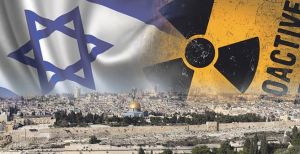
However, a host of nuclear and energy sector specialists believe that there is a danger of a similar catastrophe taking place at the nuclear reactor inside the Israeli nuclear complex in the city of Dimona in the south of Israel, which is mostly utilized for the production of weapons-grade plutonium to supply Israel’s nuclear weapons programme (in 1986, a former engineer at the Dimona nuclear centre Mordechai Vanunu fled to the U.K. and gave the British media a substantial amount of information about Israel’s nuclear programme while also commenting on the intended purpose of each building).
The nuclear complex in Dimona raises concerns primarily because of the geographical and seismic characteristics of the reactor’s location while at the same time accounting for its current technical condition.
Israel is located on the border of two tectonic plates, right on the Syrian-African tectonic fault. The Dimona nuclear complex is situated almost exactly on this fault line, in the centre of the region that is most susceptible to earthquakes. Statistics have shown that large-magnitude earthquakes occur here roughly once every 84 years. The previous large earthquake with a magnitude of 6.25 occurred here on July 11, 1927; it killed a few hundred people and devastated four large cities, including Jerusalem.
Israeli experts note that the threat of a large earthquake occurring in Israel grows more prominent every day. According to seismic research, seismologists have recorded numerous tremors over the last few years, however, they believe that a serious earthquake is “but a matter of time”. As such, Doctor Yizhaq Makovsky from the Department of Marine Geological Research at the Haifa University believes that there is presently a risk of earthquakes occurring in Israel, the largest of which, according to research, could have a magnitude of around 7.1 on the Richter scale.
Due to this, former head of the Nuclear complex in Dimona Professor Uzi Even has expressed concerns that the reactor located there could be completely destroyed in the event of one fairly large earthquake in the Middle East. He noted that the reactor in Dimona was constructed at around the same time as the power plant in Fukushima using the same American technology. He is of the opinion that a weak point in these structures is the “aged” cooling system, which needs to work at full capacity even after the reactor is shut down. The failure of the cooling system could lead to the “collapse of the reactor, which is currently happening in Japan,” which could result in a massive environmental disaster for the surrounding regions of the Middle East and North Africa. He also emphasized that there is a high chance that the nuclear reactor cooling system will malfunction in the event of planned sabotage or if it is hit by a rocket.
At the same time, the Israeli government has officially stated that this reactor is supposedly being used for research purposes and “does not pose a threat to the country’s population”.
On the other hand, several Israel Parliament representatives as well as specialists within the nuclear industry have begun to question these statements and raise the issue of the necessity to declassify all information about the Dimona reactor. This was stated, in particular, by Hadash Party Knesset official Dov Khenin. He believes that it is necessary to increase civilian control over security issues at the nuclear site. He also questioned the quality of the reactor upgrade, stating that “this upgrade, which replaced the shielding around the nuclear core, is a complex operation that requires special technology and the aid of foreign specialists,” which is impossible because Israel has no desire to sign the Non-Proliferation Treaty and, consequently, because it refuses to let foreign specialists access the site.
The necessity to attract foreign specialists, declassifying the Israeli nuclear programme and, in particular, the Nuclear complex in Dimona, allowing control by the International Atomic Energy Agency over the Israeli reactor, which is being talked about by Israeli specialists and several political officials in the country, are all in direct opposition to Israel’s current nuclear policy. This is confirmed in particular by Professor Avner Cohen, a specialist in the history of Israel’s nuclear programme. The researchers currently heading the nuclear project in Dimona should have a clear understanding of the present risks and the possible consequences of a catastrophe. Even if the site is completely safe, society will remain apprehensive if this information is not fully made public. This is why Israel needs to put a stop to its policies of excessive secrecy in the nuclear sector and to communicate with the international community.
Vladimir Odintsov is a political commentator exclusively for the New Eastern Outlook online magazine.
